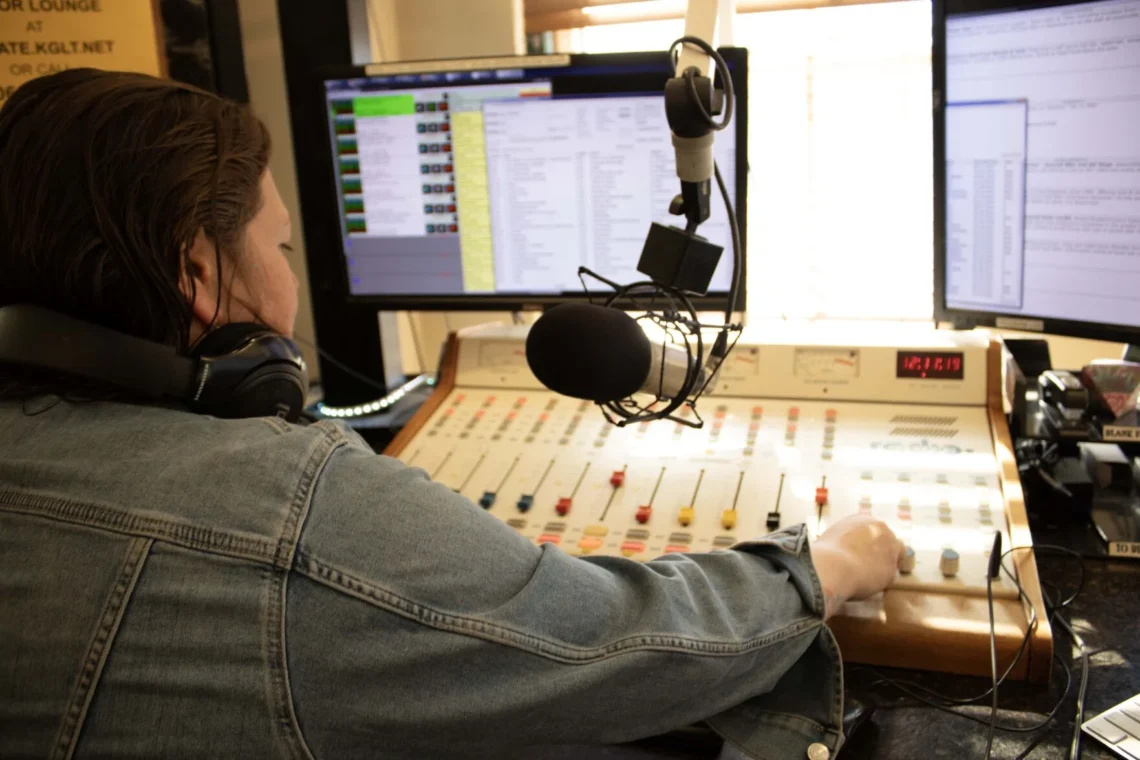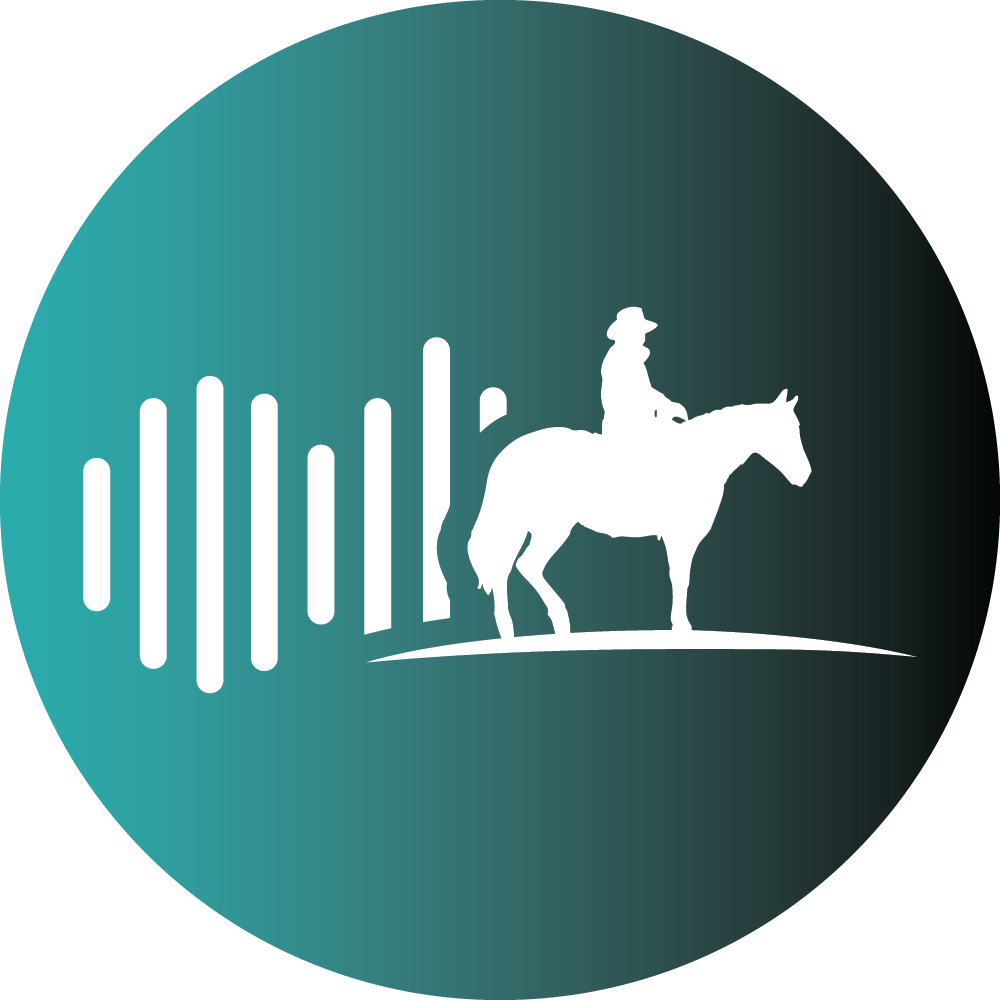By Molly Houser MSU EXPONENT
For a generation widely raised on Spotify algorithms and YouTube rabbit holes, tuning in to the radio is generally out of the question. When the ability to listen to the perfect song at the perfect time is right at our fingertips, why would anyone opt for a medium that requires far more patience?
Despite instant musical gratification being the reality for many students, on the third floor of the Strand Union Building is a radio station that, upon entering, makes one feel as though they are stepping into a time capsule. KGLT, Southwest Montana’s largest alternative public radio station, is not frozen in time, but still pulsing with the energy of an era before music was streamed on demand.
“I wouldn’t blame [younger people] if they found a radio, and they’re like, ‘Why would I listen to that?’” said KGLT General Manager Craig Clark. “I don’t think that there’s any blame. I think it’s just how technology developed — I don’t think we should be stuck with the rock forever when we have tools.”
“I do feel the new technology has somehow disassociated us with people in some way, even though we all have the same experiences of using the same apps or social media,” he said.
Gen Z is the first generation to grow up with smartphones and instant streaming, with many having limited exposure to radio. According to a 2025 Edison Research study of more than 2,000 Americans aged 13 to 24, only 16 percent reported listening to AM/FM radio and radio streams.
“I’m never like, ‘Oh, it would be really good to listen to the radio,’” said Chelsea Butler, a freshman pre-med major. “I just have other resources that work better.”
Junior political science and economics major Anthony Franseth said that radio ads make him lose interest.
“Maybe it’s a sunk-cost fallacy, but I already pay the money for Spotify,” he said. “Why would I go back? I can pick whatever song I want, and I can shuffle it and get random music I haven’t heard about yet. So, why would I just give up on having all of that?”
However, for KGLT, the goal isn’t to resist new technology — it’s about reestablishing human connection with music, Clark said.
“I do feel like people want to be in public spaces; they want to get off the internet,” he said. “Those moments of serendipity — like when you’re in the library and you go to look for a book and then you see something next to it — I think those types of experiences may not happen as much because we are losing those spaces.”
KGLT is a free-format station, meaning DJs are given complete control over what music they play, barring expletives. The station is primarily volunteer-run, with around 60 to 70 DJs compiling music for shows.
“We allow DJs to play what they want, and they can have a mixed-bag show, so to speak, so they can play different genres,” Clark said. “We’ve got people playing metal, hip-hop and electronic and bluegrass and classic rock — that’s the way for people to discover music.”
While attending MSU in the late ‘90s, DJ Kelli Rose ran a segment with her friend Paige Meyer. Over two decades later, the duo is back on the air, reviving a show reminiscent of their college days.
“Not a ton has changed about the studio, but so much around it has changed,” Rose said.
“I feel like the spirit of the station is still the same — there are so many people. There’s people who’ve had shows for 40 plus years here. There is so much cool history rooted in this.”
Rose said that while the world of technology is changing, KGLT, at its core, is still about connecting people through music.
“In the world of algorithmic playlists and all of the things, to tune into a station that has no commercials, no news, no politics, but human energy and love and curation — here’s a human who lives in your community curating music to serve you,” she said.
Production and PSA Director Kaileia Wendt graduated from MSU in 2024. While in school, Wendt started apprenticing at KGLT under another DJ.
“It’s a little intimidating, because I am young,” she said. “It’s exciting working with people that have been DJs and that have been part of KGLT for so long — more years than I have been alive.”
For Wendt, having a platform to share music is the most rewarding aspect of the job.
“It’s going to sound really basic, but I love music. I love sharing music with people,” she said, adding that having somebody share music and different genres with you is a lot more personable than tuning into a platform like Spotify where the music is already catered to the user.
In that vein, Wendt also highlighted how AI is being integrated into streaming services, citing Spotify’s AI DJ as an example.
“With the AI DJ, it’s not necessarily that abstract — it can’t be,” she said. “With the algorithm, whatever it is providing you is stuff that it assumes you will like. I think it’s important to try and branch out, and it’s hard to do that when you have no idea where to start, but you can always just tune into KGLT and be surprised with what you’re hearing.”
Student Anthony Franseth echoed this sentiment. “I used [the AI DJ] once or twice and it was awful both times,” he said. “I won’t lie, I’m a big AI defender. One, [the software] has to learn and two, Spotify just isn’t great when it comes to putting money and investing in it. If you just sort of half-ass it, it’s not going to be good.”
DJ Dave O has been with KGLT for over 10 years. His show is mainly done from his personal vinyl collection. He said that many corporate stations have moved away from the live on-air setup of traditional radio, instead opting to use pre-recorded voices accompanied by computerized music picks.
“I think that’s the disconnect in general,” he said. “And I think that’s where we make a big difference. We are those real people here and you can [call in to] talk to somebody. There is such a variety, if you don’t like it, wait three hours.”
Rose said that, while she loves the underground vibe of KGLT, she hopes that young people become more engaged.
“I would love for a younger generation to find out about us. So many students here are walking underneath [our] windows, but do they know what’s happening up here?” she said.
KGLT offers an uncredited apprenticeship class open to all majors. Clark said the program is not very time-intensive, but students have found it rewarding. “In the next 10 to 15 years, we’re going to need more younger people involved, and I think media in general is definitely going to be — well, it already is — changing drastically,” he said.
Clark said a core mission for KGLT is to expose Montana to different types of media. “I really feel that our service is exposing people to different stuff — whether it’s world or jazz or hip-hop — that we’re not usually exposed to in the West,” he said.
Ben Canon, a freshman political science major, said he’s discovered different types of music via the radio.
“I was drawn to the past ways of listening to music,” he said. “[By only using streaming services] you’re missing out on the experience of just making do with what you have — that sounds a bit old-timey, ‘Back in my day,’ blah, blah. But sometimes you find something you really like to listen to on the radio that you wouldn’t have ever thought about looking for if you had an app.”
For students looking to get involved with KGLT or expand their discography, Wendt encouraged people to get outside of their comfort zone and engage with radio.
“I think it is important that people tune into radio to show that we still matter, because we definitely do still matter,” she said. “I think it’s scary how [far] away from human connection society is moving. Even just having somebody talk to you about what the music they just played means to them — that is so important.”
“I don’t want people to forget that other humans exist and have the same interests or have the same passions as them,” she said.
To listen to KGLT in Bozeman, tune in to 91.9 FMor listen live online at https://kglt.net/.














